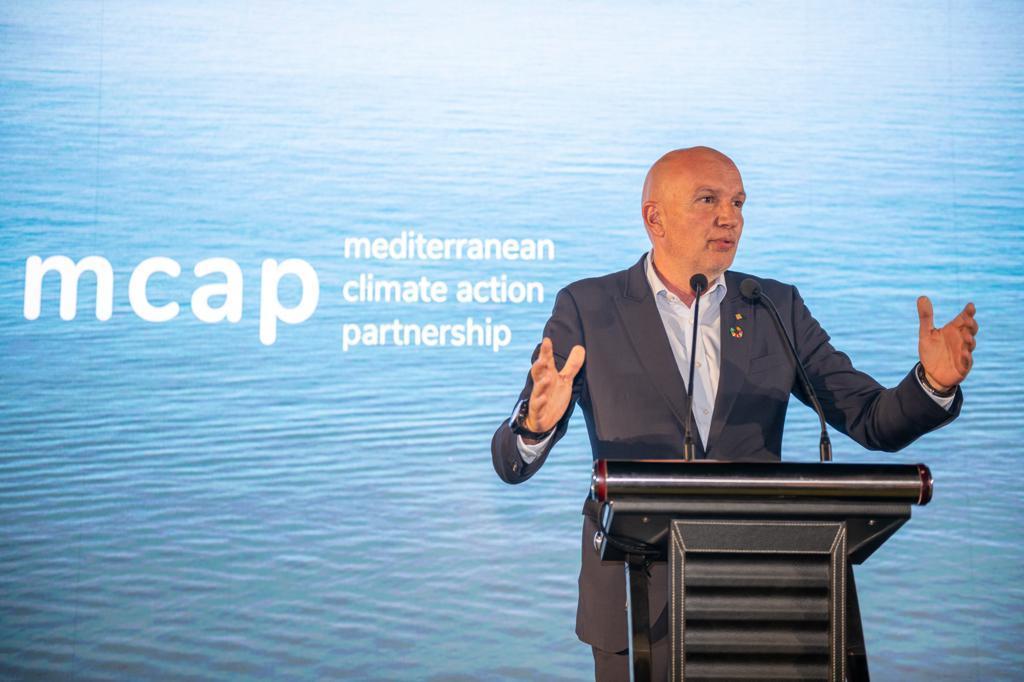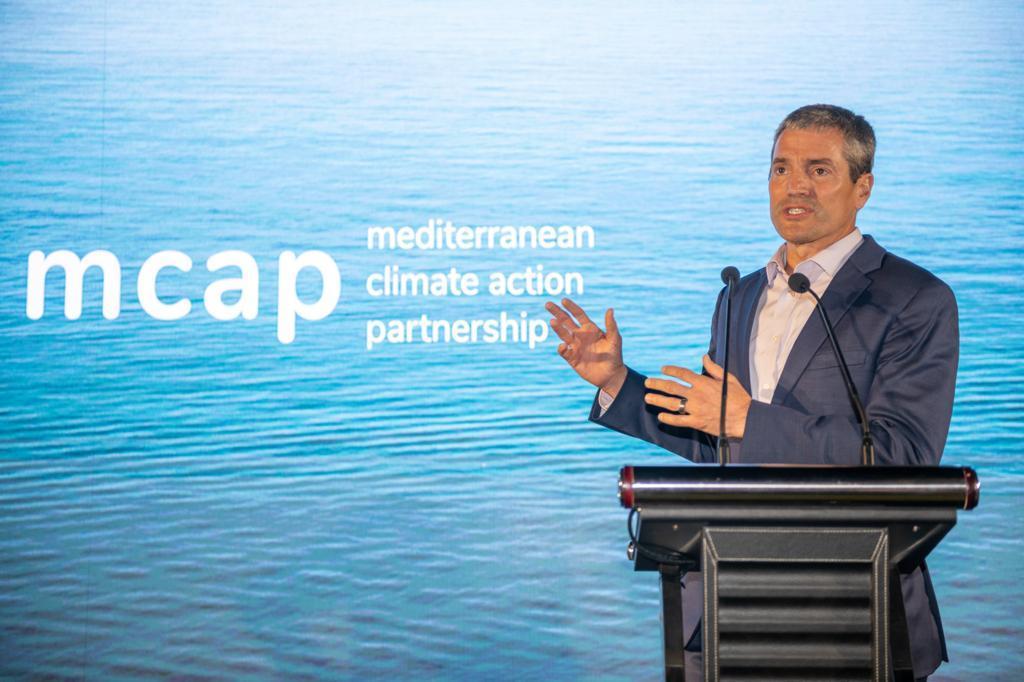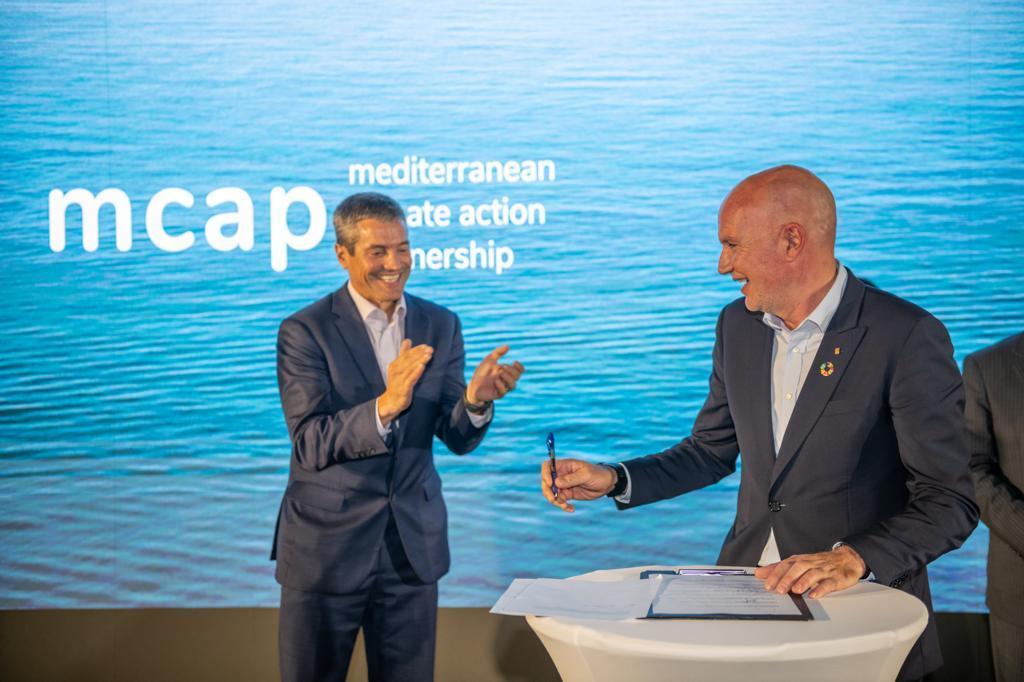Historic New Mediterranean Climate Action Partnership Sets the Global Stage for Climate Action
Global Collaboration will Help Subnational Regions Accelerate Action on Drought, Wildfire and Extreme Heat impacts.
DUBAI, United Arab Emirates, December 4, 2023 /3BL/ - Fourteen government leaders representing regions in Africa, Australia, Europe, and North and South America have signed a Statement of Commitment to establish the Mediterranean Climate Action Partnership (MCAP). In forming this new initiative, these governors, premiers, and secretaries mutually recognize their common need to share knowledge and support one another to act in the face of climate change.
This groundbreaking collaboration, launched at the 2023 United Nations Climate Change Conference (COP 28) in Dubai, reflects a growing understanding of the worldwide effects of climate change, and the need for global collaboration to address rising threats to humans and the environment by building the resilience of social and natural systems.
Regions around the world with a mediterranean climate – cool, wet winters and hot, dry summers – are particularly vulnerable to the impacts of the climate crisis. While development and economic conditions vary between countries, increasing temperatures and sea level rise are ubiquitous and will only magnify in impact throughout the 21st Century. Drought, wildfire, and extreme heat will increase in both severity and frequency, affecting the resilience of communities and ecosystems. Traditionally, mediterranean climates are located between about 30° and 45° latitude north and south of the Equator and on the western side of continents. Due to global and regional trends, impacts will be exacerbated in the coming decades, especially if global warming exceeds 1.5 to 2°C above the pre-industrial level.
Over the past year, the Government of Catalonia, in northeastern Spain, and the State of California have already begun work to convene an inaugural set of regional partners, leading to the creation of the MCAP. The fourteen government officials, all from communities with mediterranean climates, jointly recognize that building resilience to these increasingly disruptive impacts from climate change requires innovative solutions and new partnerships.
“Today's signing is another huge step for climate action and declares the need for all nations to think globally and act locally,” said California Natural Resources Secretary Wade Crowfoot. “California is no stranger to the impacts of wildfires, drought, extreme heat, and sea level rise, and through this historic partnership, we’re proud to share our knowledge with nations facing similar challenges. Together, our similarities can drive change and create a more resilient future."
"Catalonia is already adapting to climate impacts, including explosive and unforeseen weather and a three year drought,” said Catalonia’s Minister of Climate Action, Food and Rural Agenda David Mascort. “We are working to guarantee the supply of all water uses, while creating a more responsible demand of tomorrow, and we are ensuring a social shield for those affected by storms and extreme heat. We led the formation of the Mediterranean Climate Action Partnership because we believe that exchanging practice and generating new knowledge is key to responding to climate change.”
The fourteen inaugural members of MCAP are listed below.
- Baja California Sur, Mexico
- Biobio, Chile
- California, USA
- Catalonia, Spain
- Emilia-Romagna, Italy
- Marroc Oriental, Morocco
- New South Wales, Australia
- Occitanie, France
- Rabat-Salé-Kenitra, Morocco
- Region of Central Greece, Greece
- Santiago, Chile
- Tanger-Tetuán-Al Hoceïma, Morocco
- Victoria, Australia
- Western Cape, South Africa
"The challenges of climate change require a coordinated response from everyone," said Claudio Orrego, Governor of the Metropolitan Regional Government of Santiago, Chile. "The Partnership aims to do just that: in the face of common challenges of mediterranean climates, we respond with organization and joint work."
“From the outset, we joined the efforts to launch the Mediterranean Climate Action Partnership because we are convinced that this dynamic of the five continents represents an ideal space for co-define policies and accelerate climate action and address challenges in a common way,” said His Excellency Omar Moro, President of Tanger-Tetuán-Al Hoceïma.
Premier of the Western Cape, Alan Winde, said, “Like many regions worldwide, the Western Cape is vulnerable to the impact of climate change. And so as the Western Cape Government, all our future planning is geared toward being more mindful of climate change. Forming partnerships with other regions will help strengthen the global push to cut harmful carbon emissions and protect our natural environment. Our government and province support all measures and partnerships to reverse the harms of climate change.”
“NSW has seen and felt the impacts of climate change in our communities, environment and economy, said Andrew Lewis, Acting Deputy Secretary for Energy, Climate Change & Sustainability at the New South Wales Office of Energy and Climate Change. “As we move into an El Niño summer, we are particularly aware of the urgent need to build resilience against extreme heat, droughts and bushfires. This partnership provides an exciting opportunity to share our knowledge and learn from our global neighbours so that we can develop innovative solutions and accelerate climate resilience together.”
Notably, two generous philanthropies have stepped forward in support of this effort. The Conrad N. Hilton Foundation has committed $250,000, and the Gordon and Betty Moore Foundation intends to grant $100,000.
“The Conrad N. Hilton Foundation is excited to support the development and launch of the Mediterranean Climate Action Partnership,” said Sarah Smith, Director for Legacy Initiatives. “This initiative highlights the critical role of regional leadership in combating the escalating impacts of climate change. Our involvement underscores our commitment to proactive strategies that enhance the resilience and safety of our most vulnerable communities against the increasing frequency and severity of climate-related disasters.”
“The Mediterranean Climate Action Partnership brings the kind of leadership that we all need to strengthen and expand regional projects and collaboration,” said Genny Biggs, Program Director for the Gordon and Betty Moore Foundation’s Wildfire Resilience Initiative. “We’re supporting novel solutions, creative models, and aligned research to achieve enduring resilience for communities and ecosystems vulnerable to severe wildfire in Western North America; MCAP can help focus efforts to accelerate their pace and extend their impact, from regional to global.”
MCAP will be supported by an administrative office led by Resilient Cities Catalyst, an international nonprofit organization with offices in New York, USA and Athens, Greece.
“Resilient Cities Catalyst is proud to partner with regions across the globe and serve as the secretariat for the Mediterranean Climate Action Partnership,” said Founding Principal Samuel Carter. “We are excited to help circulate knowledge and practice with leaders and communities through this new important initiative.”




